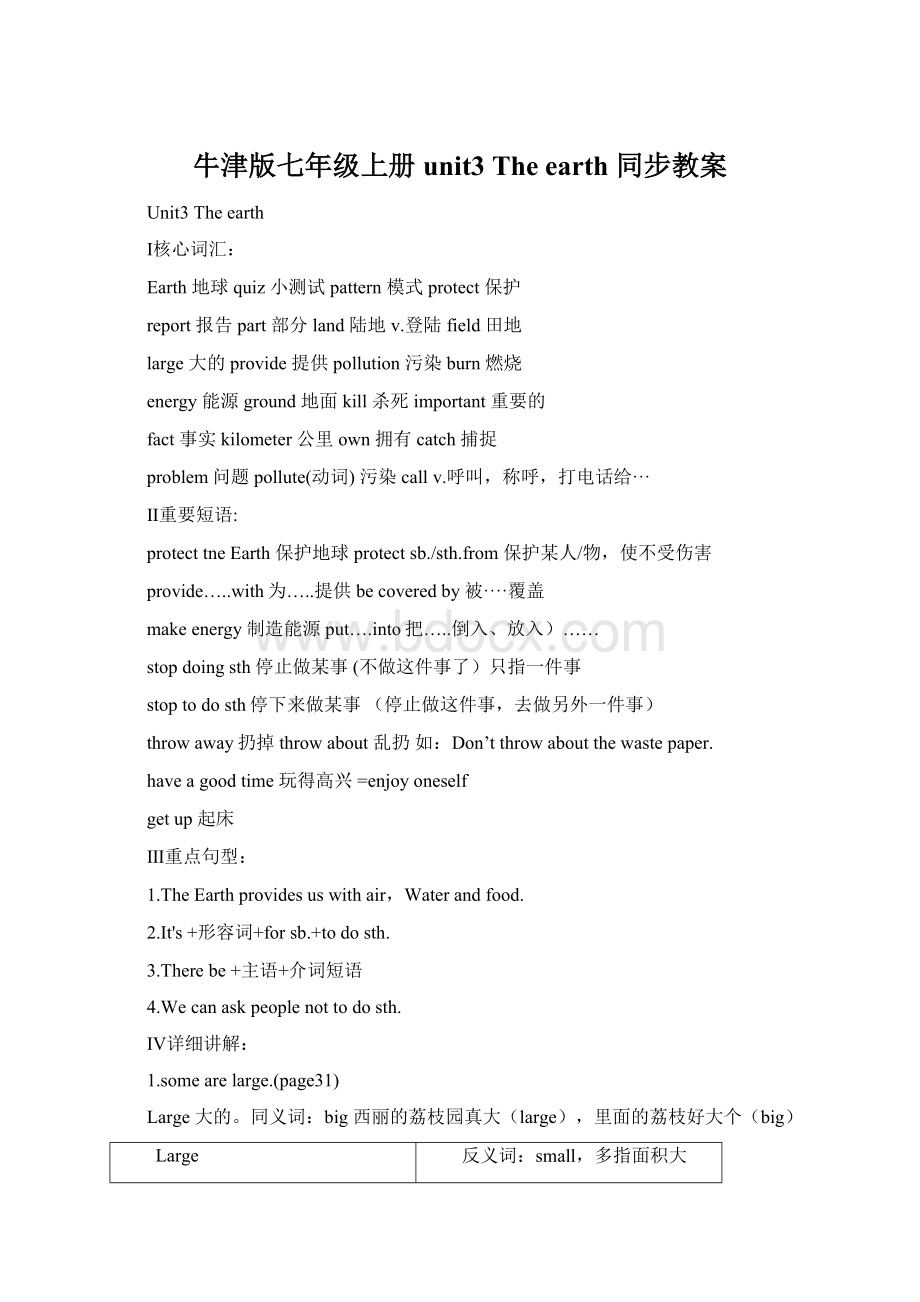牛津版七年级上册 unit3 The earth 同步教案.docx
《牛津版七年级上册 unit3 The earth 同步教案.docx》由会员分享,可在线阅读,更多相关《牛津版七年级上册 unit3 The earth 同步教案.docx(20页珍藏版)》请在冰豆网上搜索。

牛津版七年级上册unit3Theearth同步教案
Unit3Theearth
Ⅰ核心词汇:
Earth地球quiz小测试pattern模式protect保护
report报告part部分land陆地v.登陆field田地
large大的provide提供pollution污染burn燃烧
energy能源ground地面kill杀死important重要的
fact事实kilometer公里own拥有catch捕捉
problem问题pollute(动词)污染callv.呼叫,称呼,打电话给···
Ⅱ重要短语:
protecttneEarth保护地球protectsb./sth.from保护某人/物,使不受伤害
provide…..with为…..提供becoveredby被····覆盖
makeenergy制造能源put….into把…..倒入、放入)……
stopdoingsth停止做某事(不做这件事了)只指一件事
stoptodosth停下来做某事(停止做这件事,去做另外一件事)
throwaway扔掉throwabout乱扔如:
Don’tthrowaboutthewastepaper.
haveagoodtime玩得高兴=enjoyoneself
getup起床
Ⅲ重点句型:
1.TheEarthprovidesuswithair,Waterandfood.
2.It's+形容词+forsb.+todosth.
3.Therebe+主语+介词短语
4.Wecanaskpeoplenottodosth.
Ⅳ详细讲解:
1.somearelarge.(page31)
Large大的。
同义词:
big西丽的荔枝园真大(large),里面的荔枝好大个(big)
Large
反义词:
small,多指面积大
big
反义词:
little,指体积大,还可以表示“巨大,伟大,重要”的意思
great
巨大的,伟大的,除了表示重量、体积外,还表示抽象的或者精神方面的
2.TheEarthprovidesuswithair,Waterandfood.(page31)
Providesb.withsth.为某人提供某物Providesthforsb.
Provide
指“准备好必需品来供应”
YifuProvidesaroomforstudying
Offer
指“主动地提供帮助、支撑”
ThegirlOfferedtohelptheold.
3.
It'simportantforustoprotecttheEarthforourfuture.(page31)
为了我们的未来,保护地球很重要。
注意:
It's+形容词+forsb.+todosth.
It在句中作形式主语,整整的主语为不定式toprotecttheEarth.动词不定式作主语,可以放在句前也可以放在句后。
句中的谓语动词用单数。
4.Airhasnosmell.空气无味。
(page35)
no:
①修饰可数名词时,相当于nota/an
如:
shehasnobrother=shedoesn’thaveabrother
②修饰不可数名词时或者可数名词复数时,相当于notany.
Therearenodeskintheclassroom.=Therearen’tanydesksintheclassroom.
5.Wecanaskpeoplenottoeatsharkfinsoup.我们可以让人们不喝鱼翅汤。
(page37)
Asksb.todosth.要求/请求某人做某事(固定搭配)
Asksb.nottodosth.要求/请求某人不要做某事
如:
Ourteachersalwaysaskustodohomeworkafterclass.
6.Arethereanyotherthingswecando?
有一些其他的事情我们可以做吗(page38)
any
“一些”常用语否定句和疑问句中,还可以表示“任何”、“任何的”
some
常用语肯定句中,表示委婉请求的疑问句或希望得到肯定回答的问句,用“some”。
7.Wecantakeourownshoppingbagstothesupermarket.(page38)
own形容词“我们自己的”;动词“拥有”
own
“拥有”指具有法律上的所有权
Whoownsthishouse?
have
“拥有”表示某人拥有、具有、含有某物,是比较客观,强调所属关系
Ihavelonghairandblackeyes.
8.Fewerandfewerfishintheseaeachyear.(page39)海洋中的鱼越来越少。
①Fewerandfewer越来越少
比较级+and+比较级表示“越来越···”moreandmorebeautiful.
②fish在这里表示可数名词“鱼”。
表示鱼的数量,单复数是一样的。
也可以表示不可数名词“鱼肉”。
Wehavefishfordinner.
9.Whatproblemsdowehave?
我们有什么问题(page39)
problem
问题,难题。
比较麻烦或者困难的问题,
相当于difficultquestion.
Abouttheearth’sproblem
关于地球的问题
question
指比较容易解决或回答的问题
Amathquestion一个数学问题
10.Weneedairtobreath.我们需要空气来呼吸。
①Needsb./sth.todosth.需要某人/某物做某事
Needtodosth.需要做某事(Youneedtogothereatonce)
Needdoingsth.需要做某事(主语是物,主动形式表被动:
theflowersneedwatering.)
②Need也可作情态动词,但仅用于否定句或疑问句中,后接动词原形。
例:
Doesheneedtohandinhisexaminationpapernow?
他需要现在交卷吗?
-MustIfinishmyhomeworknow?
我必须先在完成我的作业吗?
-No,youneedn’t.不,不需要。
11.wecanfindoutaboutdifferenttypesoffish.我们发现不同的鱼类。
(page41)
findout
指经过观察、调查把事物查出来,搞清楚去,弄明白事情的真相。
find
偶然发现,也指通过一番寻找后有的结果,强调结果
Lookfor
寻找,有目的的找,强调寻找的动作
12.Intheend,onlyonesunremained.
Intheend“最后,最终”常常是单独使用的。
Attheendof“在···末尾”
Ⅴ语法专讲:
Grammar
一、名词的数:
名词按其所表示的事物的性质可分为可数名词和不可数名词两类。
可数名词有复数形式。
不可数名词一般没有复数形式。
可数名词的单数往往要与补丁冠词a或an连用,复数则使用其复数形式。
(一)可数名词的单复数
1.单数可数名词:
表示名词的单数,要在名词前加不定冠词a或an.a加在以辅音开头的名词前,an加在以元音开头的名词前。
如:
abookanapple
2.复数可数名词
情况
构成方法
例词
一般情况
在词尾加s
desk-desksgirl-girls
以s,x,ch,sh结尾的词
在词尾加-es
bus-busesFish-fishes
以辅音字母加y结尾的词
变y为i再加-es
FamiliesParty-parties
以元音字母加y结尾的词
在词尾加-s
Day-daysKey-keys
以f或fe结尾的词
变f或fe为v再加-es
Knife-knivesWife-wives
以辅音字母加o结尾的词
在词尾加-es
Potato-potatoesHero-heroes
英雄(heroes)爱吃西红柿(tomatoes)和土豆(potatoes)。
以元音字母加-o结尾的词
在词尾加-s
Radio-radiosZoo-zoos
注意:
(1)少数以辅音字母加o结尾的名词变为复数时只加-s。
如:
photo-photos相片piano-pianos钢琴zoo-zoosradio-radios
(2)一些名词的不规则变化
①元音发生变化
man-men男人woman-women女人foot-feet脚tooth-teeth牙
②单复数形式相同
Deer-deer鹿fish-fish鱼sheep-sheep绵羊Chinese-Chinese中国人
③词尾发生变化
Child-children孩子ox-oxen公牛
④有些名词只有复数形式
Clothes衣服trousers裤子glasses眼镜scissors剪子
(二)不可数名词
1.不可数名词的确切数量的表达方式
当表示不可数名词的确切数量时,通常可在不可数名词前面加上表示数量的单位词。
aglassofwater一杯水twoglassesofwater两杯水
Akiloofmeat一公斤肉twokilosofmeat两公斤肉
2.不可数名词的不确切数量的表达方式
当表示不可数名词的各种大概、不确切的数量时,课运用下列单词和短语:
单词:
not(any)/no没有;little几乎没有;alittle/some一些;
most大部分;all全部
短语:
alotof/lotsof/plentyof/much/agreatdealof/....许多
二、Therebe句型
Therebe结构是英语中一种常见的句型结构,表示“在某地存在某人或某物”。
肯定式
Therebe+主语+地点状语或者时间状语它的形式应与紧跟其后面做主语的名词保持人称和数的一致。
Thereisapenandthreebooksinthedesk.
Therearethreebooksandapeninthedesk.
否定式
Therebe+not+主语+其他(用上)
Thereisn’tanywater?
一般疑问句
Bethere+主语+其他?
Yes,therebe./No,therebe+not
Arethereanybooksinyourbags?
Yes,thereare./no,therearen’t
将来时结构
Therewillbe···
/therebegoingtobe··
Therewillberaintomorrow.
Thereisgoingtoberaintomorrow.
注意事项:
1.Therebe句型中be动词的形式要和其后的主语在人称和数上保持一致。
(主谓一致)
①如果句子的主语是单数的可数名词,或是不可数名词,be动词用“is”“was”。
例如:
Thereisabasketballinthebox. Thereisalittlemilkintheglass.
②如果句子的主语是复数名词,be动词就用“are”“were”。
例如:
Therearemanybirdsinthetree.
Thereweremanypeopleinthestreetyesterday.
2.如果therebe句型后的主语是几个并列名词时,要根据第一个名词的数确定be的形式,如果该名词是单数或不可数名词,be要用单数;若该名词是复数,be用复数。
(就近原则)
如:
Thereisanorangeandsomebananasinthebasket.
Therearesomebananasandanorangeinthebasket.
3.Therebe句型表示“存在有”,have\has表示“拥有”“所有”,两者不能同时使用.
ThereisgoingtohaveaclassmeetingnextWednesday.(错)
ThereisgoingtobeaclassmeetingnextWednesday.(对)下周三有个班会。
七年级牛津英语单元测试题(上)
Unit3Thenaturalworld
一、单词拼写
11.选出不同类别的单词。
1.A.EarthB.SunC.MoonD.land
2.A.clourB.whiteC.brownD.green
3.A.forestB.oceanC.seaD.river
4.A.bigB.largeC.hugeD.size
5.A.hotB.weatherC.coldD.warm
(B)根据括号中的汉语提示写单词。
6.Icanseemany______(星星)intheskyatnight.
7.The______(月球)issmallerthantheSun.
8.Wemustdosomethingtoprotectthe______.(地球)
9.Whatisthe______(海报)about?
10.Itiscloudytoday.Therearemany______(云)inthesky.
(C)根据句意从括号中选择正确的单词或短语填空。
11.______(Aquarter,Threequarters)oftheEarthisland.
12.TheMoonmovesaroundthe______(Sun,Earth).
13.Theweatheris______(different,thesame)inShenyangandHainan.
14.Today,thereis______(many,much)airpollution.
15.Completeareporton______(protecting,protect)theEarth.
(D)根据句意和首字母提示写单词。
16.Thefarmersareworkinginthef______.
17.Lookatthesmokefromthefire.Thereisalotofairp______.
18.Forestsp______shelterandfoodforanimals.
19.Waterisveryi______tous.Wecanonlyliveforthreedayswithoutit.
20.Don’tputr______intothesea.Itwillpollutethesea.
(E)根据句意和括号的汉语提示写单词。
21.Therubbishinthesea______(杀死)animalsandplants.
22.Itisimportantforus______(保护)theEarth.
23.Wemustnotletdirtywater______(污染)therivers.
24.Manypeoplestillburnwoodtomake______(能量).
25.---What’sthe______(天气)liketoday?
---It’ssunny.
(F)根据句意用括号中所给单词的适当形式填空。
26.Theweatheris______insomeplaces.(difference)
27.Whentheclassbegins,weshouldstop______andlistentotheteachercarefully.(talk)
28.Wemustdosomething______therivers.(protect)
29.Pleaseputthe______paperintotheboxoverthere.(use)
30.Wemuststoptheof______ourbeaches.(pollute)
二、翻译下列短语。
1.保护地球
2.完成报告
3.许多不同的植物
4.在陆地生活
5.在空中飞翔
6.产生能源
7.杀死动植物
8.停止做某事
9.照相
10.抓鱼
11.为……提供……
12.把……倒入/放入
13.扔掉
14.海上污染
15.在地下
三、语言运用
(A)从方框中选择适当的词或短语并用其正确形式填空。
polluteimportantunderthegroundburnintheskymake
1.Icanseemanykitesflying.
2.Theworkersarerubbish.Lookatthesmokefromthefire.
3.Wemuststoptheseas.
4.Peopleburnwoodenergy.
5.Doyouknowwhyforestsarevery?
6.ThereisalotofoilinXinjiang.
(B)同义句改写。
7.TheSearsisthetallestbuildingonEarth.
TheSearsisthetallestbuilding__________________.
8.Seaanimalssharetheoceanswithusaswell.
Seaanimalssharetheoceanswithus,______.
9.Whatelsewouldyoulike?
What____________wouldyoulike?
10.Ourdininghallprovidesuswiththreemealsaday.
Ourdininghall______withthreemeals______aday.
11.Thereisalotofpollution.
Thereis______pollution.
(C)根据所给的汉语翻译句子。
12.这些地方的天气是不同的。
13.所有的植物都需要光和水。
14.地球上有许多不同的动物。
15.对于我们还说,学好英语很重要。
四、选择填空。
1.Thedoctordidwhathecould______thatchild.
A.saveB.tosaveC.savedD.saving
2.Hewasn’tfeelingwell.Hehadto______.
A.stopsworkingB.stopworkingC.stopstoworkD.stoptowork
3.---WecanuseMSNto______witheachotheronthenet.
---Really?
Willyoushowmehowtouseit?
A.talkB.sayC.shoutD.tell
4.______crosstheroadbeforethetrafficlightsturngreen.
A.NotB.Won’tC.Don’tD.No
5.ChenBinhasreadlotsofstoriesbyChinesewriters.Nowhewouldliketoread______bywritersfrom______countries.
A.some;anyB.other;otherC.other;someD.some;other
6.Grandpashouldstop______becauseheisverysick.
A.smokingB.tosmokeC.smokeD.tosmoking
7.Forests______shelterandfood______animals.
A.protect;fromB.protect;forC.provide;withD.provide;for
8.That’sthematterbetween______.
A.IandyouB.meandyouC.youandmyD.youandme
9.There______twobowlsofriceonthetable.
A.isB.areC.hasD.have
10.It’sveryniceofyou______so.
A.sayingB.tosayingC.tosayD.say
11.What______lovelyweatheritis!
A./B.theC.anD.a
12.Let’s______atalkaboutlearningChinese.
A.hadB.havingC.tohaveD.have
13.Couldyougiveme______water?
A.anyB.someC.little